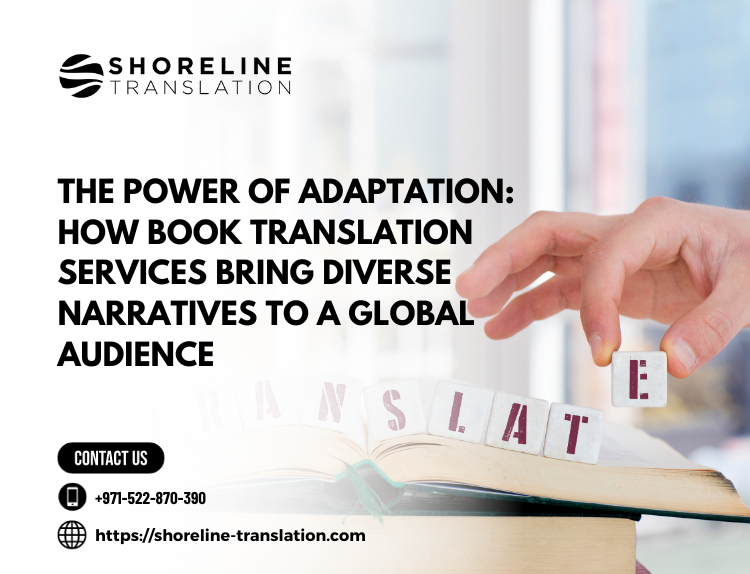Table of Contents
ToggleThe Power of Adaptation: How Book Translation Services Bring Diverse Narratives to a Global Audience
Welcome, fellow bookworms and linguistic enthusiasts, to a captivating journey into the world of literature in translation! In this age of globalization, where borders are becoming more fluid than ever before, there is an undeniable power in bringing diverse narratives to a global audience. And right at the heart of this literary revolution stands none other than book translation services.
Imagine being able to explore stories from far-off lands without even leaving your cozy reading nook. Picture the joy of discovering new voices, cultures, and perspectives through beautifully translated works that transport you beyond geographical boundaries. Thanks to the magic wielded by talented translators and the invaluable services they provide, these dreams can become reality!
Join us as we delve into the fascinating realm of book translation services – their history, benefits for both authors and readers alike, and impact on the global literary landscape – all while celebrating diversity through successful translated books. We’ll also tackle some challenges faced by translators along with tips on how to choose a trustworthy book translation service.
So sit back (with your favorite cuppa) and prepare to be transported across continents as we unravel The Power of Adaptation: How Book Translation Services Bring Diverse Narratives to a Global Audience!

Brief History of Translation in Literature
Translation has been an integral part of literature since the dawn of human expression. As far back as ancient times, scribes and scholars dedicated themselves to bringing stories from different cultures and languages into the hands of eager readers. From the epic works of Homer to the romantic tales of Shakespeare, translation has shaped literary landscapes across time.
In medieval Europe, monks painstakingly translated religious texts, ensuring that knowledge was accessible to all. During the Renaissance, translation took on a new dimension as explorers brought back exotic stories from distant lands. Translators became not just conveyors of words but also cultural ambassadors, bridging gaps between peoples and fostering understanding.
The advent of printing presses in the 15th century further expanded the reach of translated works. Suddenly, books could be reproduced en masse and distributed globally. This led to an explosion in translations and a rich tapestry of diverse narratives available for readers everywhere.
Translation is more than just converting words from one language to another; it is about preserving cultural heritage while making it accessible to a wider audience. Through translation services like Shoreline Translation’s book translation services, authors can share their unique perspectives with readers around the world – opening up windows into different cultures and encouraging empathy and understanding through literature.
Benefits of Book Translation Services for Authors and Readers
Book translation services offer a multitude of benefits for both authors and readers. Let’s explore some of the key advantages in bullet points:
For Authors:
– Expanded Audience: Translating your book allows it to reach a global audience, increasing the potential for sales and recognition.
– Cultural Exchange: By translating your work into different languages, you can foster cultural exchange and bridge gaps between diverse communities.
– Professionalism: Working with a reputable translation service ensures high-quality translations that maintain the integrity of your original text.
For Readers:
– Access to Diverse Narratives: Book translation services enable readers to access stories from all around the world, exposing them to new cultures, perspectives, and ideas.
– Language Learning Aid: Translated books provide an excellent resource for language learners as they can read familiar stories in their target language while improving their skills.
– Enriched Literary Landscape: The availability of translated literature enriches the literary landscape by adding variety and depth to reading options.
Book translation services open up a world of possibilities for authors and readers alike. They not only allow authors to share their stories with a wider audience but also give readers access to diverse narratives that broaden horizons and facilitate cross-cultural understanding.
So whether you’re an author looking to expand your reach or a reader seeking new literary experiences, book translation services are invaluable tools in connecting people through words!
The Process of Book Translation: From Selection to Publication
The process of book translation is a fascinating journey that takes a story from one language to another, allowing it to reach new audiences around the world. It all starts with the careful selection of which books to translate. Publishers and literary agents must consider factors such as cultural relevance, market demand, and potential impact on readers.
Once a book has been chosen for translation, the next step is finding the right translator who can capture not just the words, but also the essence and spirit of the original text. Translators are like linguistic alchemists, weaving their magic to ensure that every nuance and subtlety carries over into the translated version.
After translating, comes the editing and proofreading stages where experts meticulously review each sentence making sure it reads fluently in its new language without losing any meaning or intent along the way. Once these final touches have been made, it’s time for publication! The translated book will be formatted for print or digital release depending on market preferences.
Throughout this entire process of book translation—from selection to publication—countless hours of dedicated work go into bringing diverse narratives to a global audience. When done well, these translations open doors for us all to experience stories we may have otherwise missed out on—expanding our horizons and fostering understanding between cultures.
Impact of Translated Works on the Global Literary Landscape
The impact of translated works on the global literary landscape is nothing short of astounding. These books have the power to bridge cultural gaps, foster understanding, and amplify diverse voices from around the world. Through translation, stories that were once confined to a specific language or region can now reach a global audience, sparking conversations and opening minds.
Translated literature allows readers to explore different cultures and gain new perspectives. It offers a window into unfamiliar worlds, introducing us to characters with unique experiences and beliefs. By immersing ourselves in these narratives, we broaden our horizons and develop empathy for people whose backgrounds may differ from our own.
Translated works enrich the literary canon by diversifying it. They bring forth voices that might otherwise remain unheard due to linguistic barriers. This infusion of diverse narratives not only enhances the overall quality of literature but also challenges dominant narratives and promotes inclusivity within the global literary community.
Translated books contribute significantly to cross-cultural dialogue and exchange. They facilitate meaningful conversations between authors from different countries as well as their readership worldwide. These interactions foster mutual respect and appreciation while promoting intercultural understanding in an increasingly interconnected world.
In conclusion, by breaking down language barriers and embracing book translation services, we empower authors to share their stories with audiences far beyond their native tongues. The impact of translated works on the global literary landscape cannot be overstated – they reshape our perceptions, encourage diversity, and ultimately create a more inclusive world through the power of words!
Celebrating Diversity through Translation: Examples of Successful Translated Books
Translation has the incredible power to bridge cultural gaps and bring diverse narratives to a global audience. Through book translation services, readers all over the world can access stories from different cultures, expanding their horizons and celebrating diversity. Let’s take a look at some examples of successful translated books that have made an impact on the literary landscape.
One shining example is “The Girl with the Dragon Tattoo” by Stieg Larsson. Originally written in Swedish, this gripping thriller captured international attention after being translated into multiple languages. The complex characters and suspenseful plot resonated with readers worldwide, highlighting the universal appeal of well-translated literature.
Another notable success story is “One Hundred Years of Solitude” by Gabriel Garcia Marquez. This masterpiece of magical realism originated in Spanish but found a global following through its translations. Its rich storytelling and vivid imagery allowed readers from various cultures to immerse themselves in the enchanting world created by Marquez.
We cannot overlook the impact of Haruki Murakami’s works on the global stage. Translations of his novels like “Norwegian Wood” and “Kafka on the Shore” have captivated audiences beyond his native Japan, showcasing his unique blend of surrealism and introspection.
These examples demonstrate how book translation services enable us to celebrate diversity by opening doors to new voices and perspectives. By embracing translated literature, we foster understanding between cultures while enriching our own reading experiences.
Challenges and Controversies in Book Translation
Translating a book is no easy feat. It requires not only linguistic skills but also cultural understanding and sensitivity. As such, it comes as no surprise that challenges and controversies often arise in the field of book translation.
One of the main challenges faced by translators is capturing the essence of the original work while adapting it to a different language. Each language has its nuances, idioms, and cultural references that may not have an equivalent in another language. Finding creative solutions to convey these elements accurately can be both daunting and time-consuming.
Controversies can also emerge when translating books with sensitive or controversial subject matter. Translators must navigate ethical dilemmas when dealing with potentially offensive or culturally inappropriate content. The goal is always to strike a balance between staying true to the author’s intent and respecting societal norms in different cultures.
Navigating these challenges and controversies requires skilled translators who possess deep knowledge of both languages involved as well as a high level of cultural competence. By acknowledging these difficulties, we can better appreciate the artistry behind book translation services and their crucial role in bridging diverse narratives for global audiences!
How to Choose a Trustworthy Book Translation Service
When it comes to choosing a trustworthy book translation service, you want to make sure your beloved story is in good hands. But with so many options out there, how do you know which one to pick? Fear not, my literary friend, for I have some tips that will guide you through this crucial decision.
First and foremost, reputation is key. Look for a translation service that has garnered positive feedback and reviews from authors who have previously used their services. Word of mouth speaks volumes in the world of literature!
Next, consider the expertise of the translators themselves. Are they native speakers or fluent in both languages? Do they specialize in specific genres or types of books? A translator who understands and appreciates the nuances of your work will ensure that its essence remains intact throughout the translation process.
Pricing and turnaround time are practical factors to take into account. While quality should never be compromised for a lower price or faster delivery, finding a balance that fits within your budget and timeline is essential.
So remember: reputation, expertise, and practicality are three guiding principles when choosing a trustworthy book translation service. With these criteria at hand, let your treasured tale travel far beyond borders!
Shoreline Translation Offers Trustworthy Book Translation Services
When it comes to book translation services, one name stands out from the rest: Shoreline Translation. With their commitment to accuracy, cultural sensitivity, and exceptional quality, they have earned a reputation as a trusted provider in the industry.
At Shoreline Translation, they understand that translating books is not just about converting words from one language to another. It’s about capturing the essence of the original work and bringing it alive in a new language for readers around the world to enjoy. Their team of expert translators are not only fluent in multiple languages but also deeply knowledgeable about different literary genres and styles.
What sets Shoreline Translation apart is its dedication to preserving the author’s unique voice while ensuring that nothing gets lost in translation. They take great care in selecting translators who have a deep understanding of both cultures involved, allowing them to effectively convey nuance and meaning without compromising on authenticity.
With an extensive network of professional linguists and editors worldwide, Shoreline Translation has the resources and expertise needed to handle projects of any size or complexity. Whether you’re an aspiring author looking to reach new audiences or an established writer seeking international recognition, their book translation services offer you a pathway toward success.
Choose Shoreline Translation for your book translation needs and experience firsthand why they are considered one of the most trustworthy providers in the industry. Let them help you bridge linguistic barriers and bring your stories to life for readers across borders!
FAQs
1. How long does the translation process take?
The duration of the translation process depends on various factors, such as the length and complexity of the book, as well as the availability of translators. On average, it can take anywhere from a few months to over a year to complete a high-quality translation.
2. Can any book be translated?
In theory, yes! However, certain books may pose unique challenges due to cultural references or linguistic nuances that require careful consideration. Additionally, copyright permissions and financial considerations may also play a role in determining which books get selected for translation.
3. How do I find a reliable book translation service?
When choosing a book translation service, it’s essential to consider their expertise in your target language(s), their track record with previous translations, and their understanding of your specific genre or subject matter. Reading reviews and seeking recommendations can also help you find reputable providers.
Conclusion
In an increasingly interconnected world, book translation services have become an essential tool in bringing diverse narratives to a global audience. Through the power of adaptation, these services enable authors and readers alike to explore stories from different cultures and perspectives.
From its humble beginnings to the present day, translation has played a crucial role in literature. It has bridged gaps between languages and allowed for the exchange of ideas and experiences across borders. With book translation services becoming more accessible than ever before, authors now have the opportunity to reach wider audiences beyond their native language.
The benefits of book translation services are numerous. For authors, it opens up new markets and expands their readership potential. It allows them to share their stories with people who may not have otherwise had access to them. Readers, on the other hand, gain exposure to new voices and perspectives that enrich their understanding of different cultures.
The process of translating a book involves careful selection by publishers or translators themselves based on literary merit or market demand. Translators then embark on the challenging task of capturing not just the words but also the essence and cultural nuances of the original text.
Translated works have made a significant impact on the global literary landscape by introducing readers around the world to unfamiliar themes, settings, and characters. They broaden our horizons by offering insights into diverse cultures while fostering empathy and understanding among different communities.
There are numerous examples of successful translated books that celebrate diversity through storytelling: “One Hundred Years of Solitude” by Gabriel Garcia Marquez brought Latin American magical realism into mainstream literature; “The Girl with The Dragon Tattoo” by Stieg Larsson introduced Scandinavian crime fiction; “Memoirs Of A Geisha” by Arthur Golden offered Western readers an intimate glimpse into Japanese culture.
While there are many rewards in translating books, there are also challenges and controversies surrounding this practice. Some argue that translations can never fully capture all aspects of an original work due to linguistic limitations or differences in cultural contexts. Others debate the issue of authenticity and whether translators should adopt more creative license in adapting foreign works.
Ultimately, choosing a trustworthy book translation service is crucial to ensure the integrity and accuracy of translated works. Factors such as reputation, expertise, and practicality must be considered when making this decision. At Shoreline Translation, we pride ourselves on our commitment to quality and cultural sensitivity in bringing diverse narratives to a global audience.
In conclusion, the power of adaptation through book translation services cannot be underestimated. It has the ability to connect people from different cultures and foster understanding through literature. So let us continue to celebrate diversity by embracing translated works with open arms – for it is through these stories that we can truly appreciate the beauty and complexity of our world!





